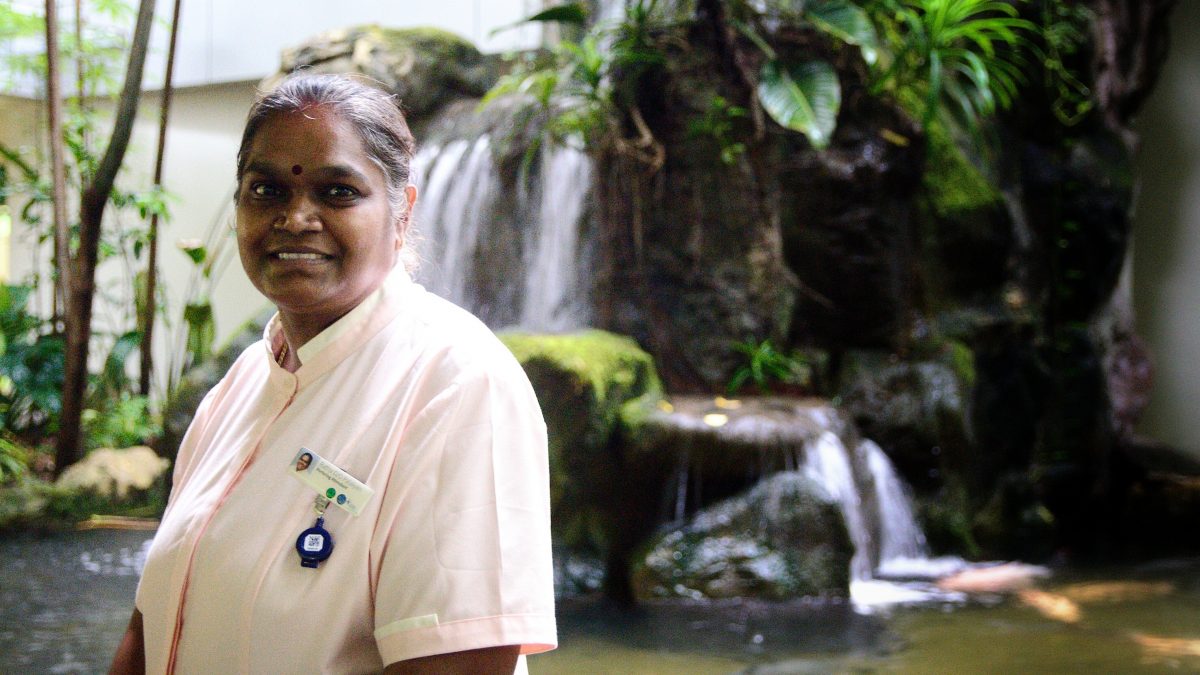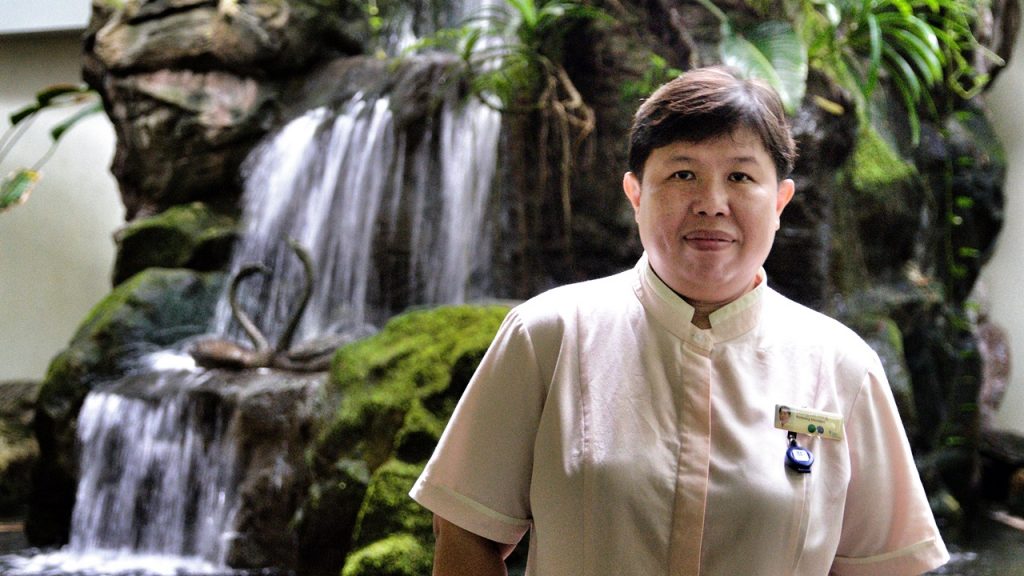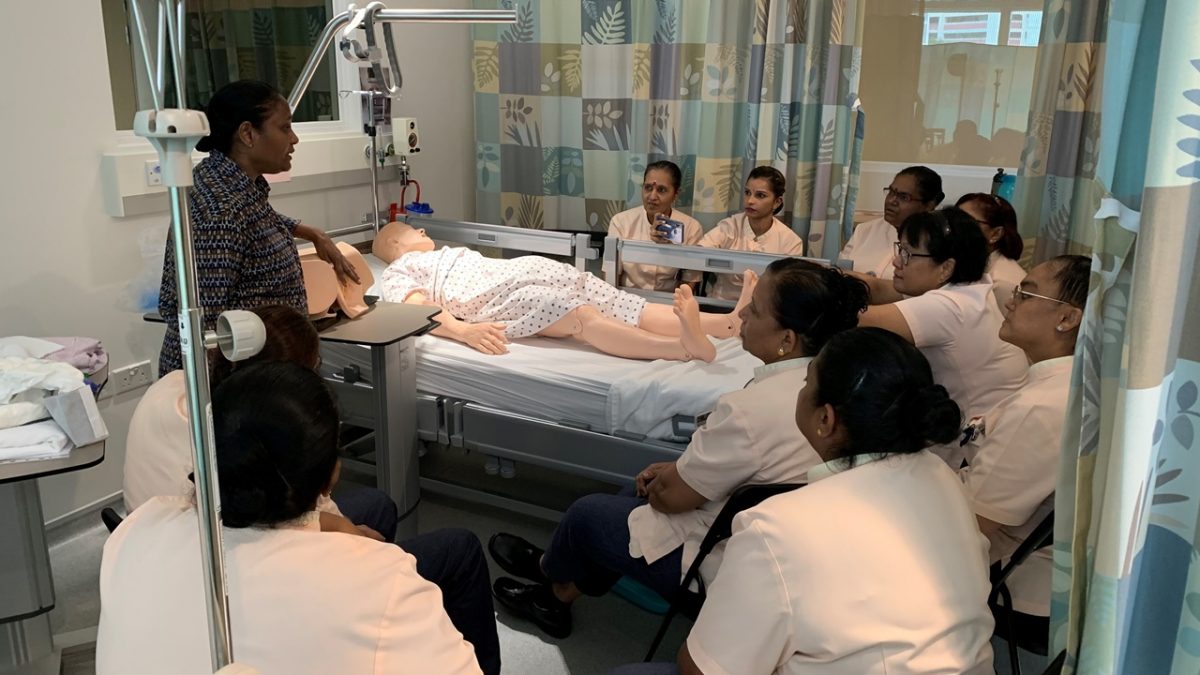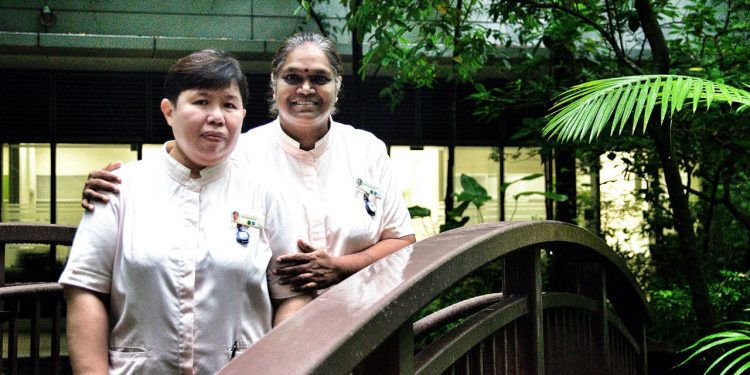I first met Mdm Ratha Palaiyan and Mdm Leong Lai Hong at Khoo Teck Puat Hospital (KTPH) on 18 November 2019.
I was at the hospital to find out more about a job re-design that would see all 46 of the hospital’s porters take on new roles as healthcare chaperones, while the existing porter role gets outsourced to an external party.
Though noticeably anxious, they both greeted me with warm smiles as I entered the boardroom for the interview.

Mdm Ratha Palaiyan
With over 20 years of healthcare experience, Ratha, 53, was one of the many staff who continued their service with the hospital when they moved from Alexandra Hospital in 2010.
When she was first told about the job re-design, she was understandably anxious about the new responsibilities that came with the role.
As a hospital porter, Ratha’s involvement with direct patient care was minimal; her daily tasks included moving patients and other medical paraphernalia between the various areas of the hospital.
As a healthcare chaperone, her direct involvement in patient care would increase substantially, involving feeding, communicating and assisting of the patients around the ward just to name a few.
Ratha’s initial apprehension towards this new, unfamiliar role initially prompted her to request for a transfer out of the department. But with the encouragement of her supervisors, she soon found the confidence to take up this new challenge.

Mdm Leong Lai Hong
Lai Hong spent most of her career working in a factory assembly line for a Japanese multi-national company.
After having spent three decades in the factory setting, the single 52-year-old decided that she wanted to take on a more meaningful role.
“I wanted to work more closely with people and to help people,” she explained to me in Mandarin. “I was going through the papers when I came across this porter role, applied for it and have been here ever since.”
Lai Hong joined KTPH for approximately a year before the job re-design took place in September this year.

The Job Re-design
As part of the hospital’s journey towards Industry 4.0, the job re-design was conceived to equip the porters with the necessary technological and technical skills for them to adapt effectively to the modern labour market and remain relevant in the ever-evolving healthcare industry.
With the porter role expected to become heavily automated in the future, KTPH decided to upskill the existing staff pre-emptively, creating opportunities for them to become more involved with direct patient care, while simultaneously improving their work prospects and professional security.
To kickstart the programme, KTPH first worked with the Healthcare Services Employees’ Union (HSEU) to send the porters for a one-day course on Change Management, to prepare them for the changes that lay ahead.
After which the porters attended eight half-day courses with Republic Polytechnic, equipping them with the relevant competencies in basic patient care, therapy and nutrition skills, and other general duties.
Currently, the newly appointed healthcare chaperones are understudying healthcare assistants and nurses at the wards to further foster their operational awareness.
A Welcomed Change
Eventually, when both Ratha and Lai Hong had warmed up to me during the interview, they expressed their gratitude towards the management for the opportunity and entrusting them with greater responsibilities.
Ratha recalled her experience with an elderly patient who was unable to feed himself due to his ailments. She shared how grateful he was to her for feeding him and providing a listening ear in his moments of vulnerability, re-enacting his gesture of gratitude, his hands clasped together in thanksgiving.
“Money is something you can work hard and earn,” she stuttered while trying to control her emotions. “But this kind of blessings from another person in need is something that is worth far more than just money.”
Lai Hong shared the same initial concern with Ratha saying: “When I first found out about the outsourcing, I thought I was going to get laid off after only a year of working here.
“However, after learning about the chaperone role and going through the training, I do appreciate the change so far.”
Lai Hong often recalls an encounter with one patient who was so positively impacted by their interactions, that she said she would “always remember” her.
Till today, she remains emotional when recounting this connection.

